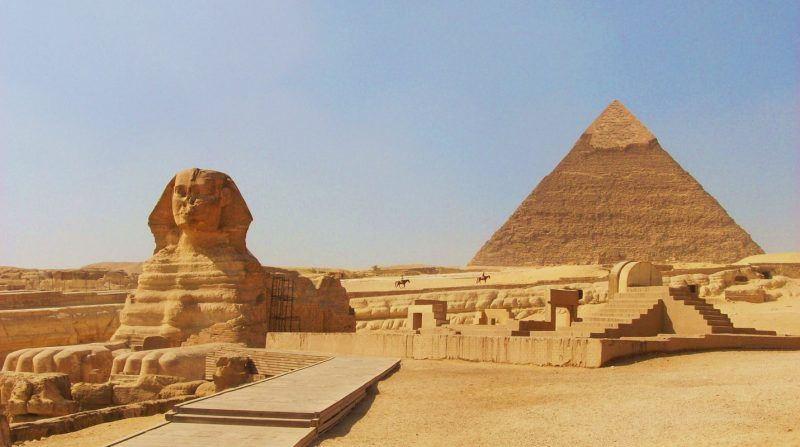The
Sphinx of Giza

Artwork Name : The Sphinx Of Gaza
Location : Giza Plateau
The word 'sphinx' is Greek and came to be applied to the Egyptian sculpture at Giza, according to Verner (and others) through a translation of the Egyptian name shesep-ankh ("living image") by which the Egyptians referred to the piece as well as to other representations of royal figures. While that may be, it is also quite likely that the statue simply reminded Greek writers of their own mythical sphinx, such as the one famous in the story of Oedipus, with the body of a beast and head of a woman. Greek visitors to the site, scholars such as Verner claim, mistook the nemes (the striped headcloth of the king) for a woman's shoulder-length hair.
During the time of the New Kingdom of Egypt (1570-1069 BCE), the Sphinx was known by the Egyptians as Horemakhet (Horus of the Horizon) and a cult grew up around the statue associating it with the god Horus. A 'cult' in ancient Egypt should be understood along the lines of a sect of a religious movement in the present day; not a cult as a modern reader understands that term. This was a solar cult which venerated Horus in his role as a sky god. Amenhotep II (1425-1400 BCE) may have patronized this cult.
The Pyramids of Giza

The Character Sphinx Of Gaza
- The Sphinx is truly a mysterious marvel from the days of ancient Egypt. The body of a lion with the head of a king or god, the sphinx has come to symbolize strength and wisdom.
- From the north side the profile of the Sphinx reveals the proportion of the body to the head. It would appear as though the head is small in proportion to the body. Because of the changing desert terrain, the body of the Sphinx has been buried several times over the past several thousand years.
- Most recently in 1905, the sand has been cleared away to expose the magnitude and beauty of the entirety of the Sphinx. The paws themselves are 50 feet long (15m) while the entire length is 150 feet (45m). The head is 30 (10m) feet long and 14 feet (4m) wide. Because certain layers of the stone are softer than others, there is a high degree of erosion that has claimed the original detail of the carved figure.
The most popular and current theory of the builder of the
Sphinx holds that it was commissioned by the 4th Dynasty King, Khafre
(2558-2532 BCE). Khafre was one of the sons of Khufu (AKA Cheops). The Sphinx
lines up with the Pyramid of Khafre at the foot of its causeway. As one rounds
the northeast corner to the front of the Sphinx, the alignment of the two
structures becomes more apparent.
In my conclusion, the 18th Dynasty story tells of the time that Thutmosis IV
fell asleep under the Sphinx which was covered to the neck in sand. Thutmosis
had a dream that the Sphinx spoke to him and promised that if he would free the
Sphinx from the sand, Thutmosis would be destined to become king of Egypt.
Atlas of Ancient Egypt, Baines, John; Malek, Jaromir ; 1980
.Les Livres De France. www.guardians.net/egypt/sphinx/
"Pyramids of Giza - New World Encyclopedia".
www.newworldencyclopedia.org. Retrieved 23 October 2017. https://en.wikipedia.org/wiki/Great_Sphinx_of_Giza
Smithsonian Magazine , February2010. http://www.smithsonianmag.com/history/uncovering-secrets-of-the-sphinx-


No comments:
Post a Comment